Boeing
Boeing, a name synonymous with aviation and aerospace technology, plays a crucial role in the travel industry by designing and manufacturing some of the world’s most advanced aircraft. As a cornerstone of modern air travel, Boeing's impact extends worldwide, touching numerous aspects of travel, from commercial aviation to international transport logistics. This legacy, built over a century, has not just transformed how we travel but has fundamentally reshaped our world by making it more interconnected and accessible.
The Evolution of Air Travel
From its inception in 1916, Boeing has been at the forefront of aviation innovation. The company began its journey with the production of seaplanes and quickly expanded into military and commercial aircraft. The introduction of the Boeing 707 in the late 1950s marked a significant milestone, as it was among the first jetliners to revolutionize commercial air travel by offering faster and more efficient flights. This innovation opened up a new era in travel, making long-distance, international flights feasible and increasingly affordable for the general public.
Commercial Aircraft and Global Connectivity
In terms of travel, Boeing's commercial aircraft division continues to be a driving force. The Boeing 747, famously known as the “Jumbo Jet,” set new standards upon its launch in 1970. Its large capacity and long-range capabilities made air travel more accessible, effectively shrinking the world and enabling unprecedented levels of global connectivity. Today, Boeing's portfolio includes various models like the 737, 777, and the state-of-the-art 787 Dreamliner, each designed to address different aspects of air travel.
The Boeing 787 Dreamliner is particularly noteworthy for its advanced technology, including a focus on fuel efficiency, reduced emissions, and enhanced passenger comfort. These innovations have made long-haul flights less taxing, both environmentally and physically, improving the overall travel experience for millions of passengers annually. The 787 has helped airlines open new direct routes, bypassing traditional hubs and thereby reducing travel times for countless travelers.
Safety and Reliability
One of Boeing's cornerstone principles is ensuring the safety and reliability of its aircraft. The company invests heavily in research and development to improve aircraft safety, utilizing advanced materials and technologies. Boeing has consistently worked on improving safety features, from advanced cockpit design to the incorporation of sophisticated avionics. These technologies aid pilots in maintaining control of the aircraft under various conditions, thereby minimizing the risk of incidents and ensuring safe passage for millions of travelers.
Training is another key element in Boeing's approach to safety. The company provides comprehensive training programs for pilots, maintenance staff, and flight operations teams, ensuring that all personnel are well-prepared to handle Boeing's complex machinery. These efforts underscore Boeing’s commitment to maintaining a flawless safety record and enhancing passenger confidence in air travel.
Influence on the Airline Industry
Beyond just manufacturing aircraft, Boeing significantly influences the broader airline industry. The company frequently collaborates with airlines to develop new models that meet ever-changing consumer demands and industry standards. Close partnerships allow Boeing to tailor its offerings to diverse markets, accommodating various seating capacities, passenger amenities, and technological advancements.
Boeing's influence extends to strategic collaborations aimed at sustainable aviation. The company is actively involved in projects to develop sustainable aviation fuels (SAFs) and explore alternative propulsion systems. These endeavors align with a global imperative to reduce carbon footprints and support the airline industry in its efforts to achieve sustainability goals. By championing these innovations, Boeing is not just shaping the future of travel but is also positioning itself as a leader in the movement towards environmentally responsible aviation.
The Travel Experience
Boeing's impact on travel is also evident in passenger experience enhancements. The Dreamliner, for instance, is renowned for its passenger-centric features such as larger windows, quieter cabins, and improved air quality. These elements are crucial in offering passengers a more enjoyable travel experience, reducing the fatigue associated with long-haul flights and improving overall comfort.
The introduction of cutting-edge inflight entertainment systems and connectivity options also reflects Boeing’s commitment to passenger satisfaction. With more travelers expecting seamless connectivity, Boeing's efforts in integrating WiFi and advanced entertainment systems ensure that passengers remain connected and engaged throughout their flights.
Technological Advancements and the Future of Travel
As travel continues to evolve, technological advancements are at the forefront, and Boeing is at the helm of this transformation. The incorporation of artificial intelligence, data analytics, and predictive maintenance is becoming a hallmark of Boeing’s approach. These technologies streamline operations, enhance safety, and improve the efficiency of travel, paving the way for smarter and more resilient air travel systems.
Research into autonomous flight technology is another area where Boeing is making strides. While fully autonomous commercial flights may still be a vision for the future, the potential for semi-autonomous operations could redefine the airline industry. This innovation would likely increase safety, reduce pilot workload, and present new possibilities for travel logistics.
Global Economic Impact
Boeing's role in travel extends beyond just moving people from one point to another—it has a substantial economic impact globally. The company's aircraft facilitate international trade and tourism, significantly contributing to the global economy. Boeing's operations also support a vast network of suppliers and partners, creating millions of jobs worldwide and fostering economic development.
Moreover, Boeing's investments in community and educational programs reflect its commitment to social responsibility, preparing the next generation of aviation professionals and supporting local economies. By nurturing innovation and development, Boeing ensures a vibrant and sustainable future for global travel and trade.
In conclusion, Boeing stands as an indispensable pillar in the field of travel. Its contributions range from pioneering aviation technology and improving passenger experiences to playing a vital role in the economic landscape of air travel. As the company continues to innovate and adapt to changing times, Boeing remains a symbol of progress, connectivity, and the endless possibilities of human travel and exploration.
Boeing 777X April Test Flight, Lufthansa Delivery 2027

FAA Boeing MAX 10 Certification Still Pending in 2026

Alaska Airlines Boeing Order Adds 737-10s, 787s
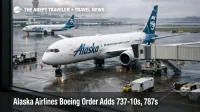
United Flight 803 Returns To Dulles After Engine Failure

FAA lifts Boeing 737 MAX production cap to 42 per month
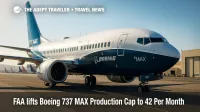
FAA restores Boeing certification authority for some 737 MAX, 787
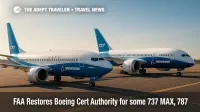
Aircraft Shortages Through 2026: Airbus 62 jets, Boeing 47 Deliveries in July
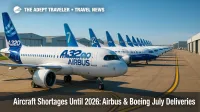
Boeing Strike Threatens Jet Supply Chain

Boeing defense strike vote could ripple into trans-Pacific travel

FAA Delays on Boeing 737 MAX 10 Hit Airline Capacity
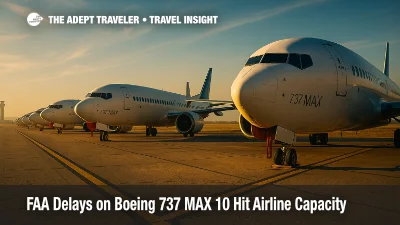
Boeing Strike Extends: How Travelers Could Face Higher Airfares and Fewer Flights

Boeing Strike Tentative Deal: Implications for Travelers and Airlines

Boeing Strike Extends Supply Chain Disruptions and Impacts Air Travel

